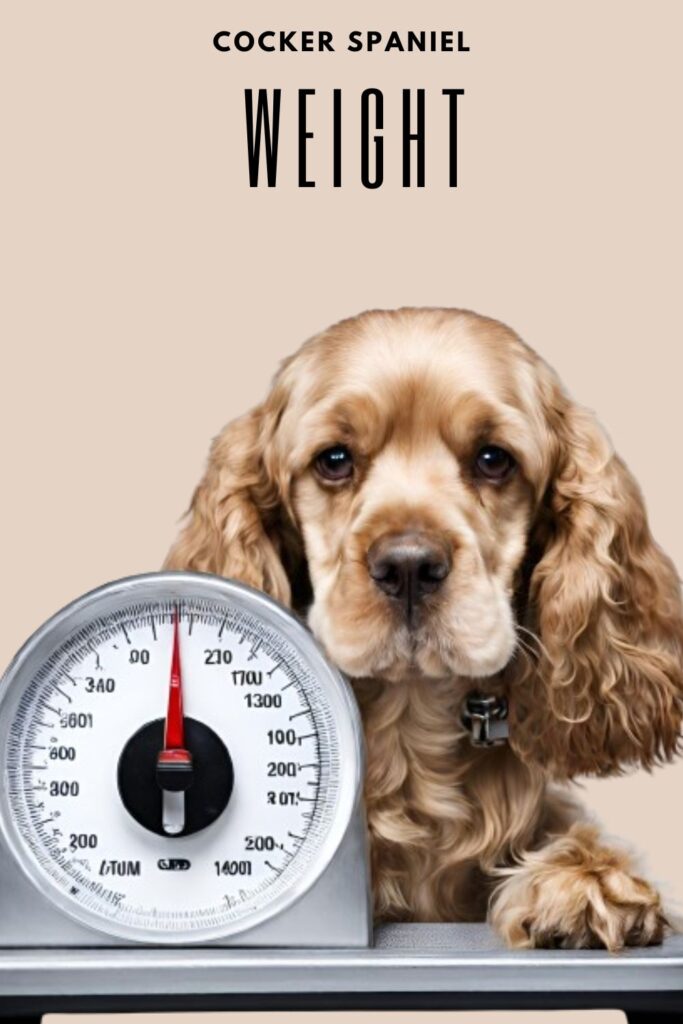Introduction
Welcome to the world of The Cocker Spaniel weight, exploring the factors that influence it, the ideal weight range, and the methods to keep your furry friend healthy and happy. Welcoming a Cocker Spaniel into your home brings forth the responsibility of ensuring their well-being, and a crucial aspect of that is maintaining an optimal weight.
What Influences Cocker Spaniel Weight?
Understanding the factors that contribute to Cocker Spaniel Weight is the first step in their care. Explore the impact of genetics, age, gender, and overall health on their weight. Gain insights into how these factors interact and influence their nutritional needs.
The Cocker Spaniel weight can be influenced by various factors, including genetics, age, gender, and overall health. Genetics play a significant role, as certain bloodlines may predispose dogs to be larger or smaller. Age also affects weight, with puppies typically being lighter and then gradually gaining weight as they mature. Gender can also play a role, with male Cocker Spaniels generally being larger and heavier than females.
Maintaining optimal Cocker Spaniel weight is essential for the overall health and well-being of Cocker Spaniels. Factors such as genetics, age, gender, and health status interact to determine their nutritional needs.
Owners should monitor their dog’s weight closely, adjust their diet accordingly, and ensure they receive regular veterinary check-ups to address any health issues that may impact their weight. A balanced diet tailored to their specific needs, along with regular exercise, can help Cocker Spaniels maintain a healthy weight and live a happy, active life.
The Ideal Cocker Spaniel Weight Range – Striking the Perfect Balance
Discover the ideal weight range for Cocker Spaniels and why maintaining it is vital for their health and longevity. This section provides a detailed breakdown of weight guidelines for different life stages, ensuring you have a clear roadmap for your Cocker Spaniel’s well-being.
The ideal Cocker Spaniel weight typically falls between 20 to 30 pounds for females and 25 to 35 pounds for males. However, these ranges can vary slightly depending on factors such as genetics, bone structure, and overall body composition. It’s essential to monitor your Cocker Spaniel’s weight regularly and consult with a veterinarian to ensure they remain within the appropriate range for their size and breed.
Maintaining an ideal Cocker Spaniel weight is vital for the health and longevity of Cocker Spaniels. Excess weight can lead to various health issues, including joint problems, heart disease, diabetes, and reduced mobility.
Conversely, being underweight can indicate underlying health issues or malnutrition. By keeping your Cocker Spaniel within the recommended weight range through a balanced diet, regular exercise, and proper veterinary care, you can help ensure they live a long, healthy, and happy life.
Nutrition and Exercise – Key Players in Cocker SpanielWeight Management
Dive into the realm of nutrition tailored to meet the specific needs of Cocker Spaniels. Learn about portion control, suitable diets, and the role of regular exercise in maintaining their weight. Uncover the secrets to a well-rounded, fulfilling diet that caters to both their taste buds and health requirements
Nutrition plays a crucial role in the health and well-being of Cocker Spaniels, and providing a balanced diet is essential to maintain their optimal weight. Portion control is key to preventing overfeeding and obesity, so it’s important to measure their food accurately and adjust portions based on their age, activity level, and individual metabolism.
High-quality dog food formulated specifically for small to medium-sized breeds, with appropriate protein and fat levels, is recommended to meet their nutritional needs.
In addition to a well-balanced diet, regular exercise is essential for Cocker Spaniels to maintain a healthy weight and overall fitness. Daily walks, playtime, and interactive activities not only help burn calories but also stimulate their minds and prevent boredom.
Incorporating a variety of activities into their routine, such as agility training or swimming, can keep them engaged and physically fit. By combining portion control, a balanced diet, and regular exercise, owners can ensure their Cocker Spaniels enjoy a fulfilling and healthy lifestyle.
To learn about the cocker spaniel lifespan, click this link: How Long is a Cocker Spaniel Lifespan?
.
Recognizing Weight-Related Issues – Signs and Solutions
Awareness is crucial in preventing and addressing weight-related issues. Explore the signs of both underweight and overweight Cocker Spaniels and the potential health implications. This section equips you with the knowledge to identify, address, and seek professional guidance when needed.
Recognizing signs of underweight and overweight Cocker Spaniels is vital for their health.
Signs of underweight dogs include visible ribs, hip bones, and a prominent backbone. They may also appear lethargic, have a dull coat, and lack enthusiasm for activities. Conversely, overweight Cocker Spaniels may have difficulty breathing, excessive panting, and struggle with mobility. They may also show signs of fatigue during exercise and have trouble grooming themselves properly.
Both underweight and overweight Cocker Spaniels are at risk of health complications. Underweight dogs may suffer from weakened immune systems, susceptibility to infections, and nutrient deficiencies.
Overweight dogs are prone to joint problems, diabetes, heart disease, and reduced life expectancy. It’s crucial for owners to monitor their Cocker Spaniels’ weight regularly, address any signs of weight-related issues promptly, and seek professional guidance from a veterinarian to ensure their pet’s health and well-being.
Conclusion
Caring for your Cocker Spaniel’s weight is an ongoing commitment rooted in love and responsibility. As we conclude this exploration, we invite you to share your experiences, tips, or questions in the comments below. Let’s build a community dedicated to the well-being of our Cocker Spaniel companions, fostering a supportive space for shared insights and collective learning.



